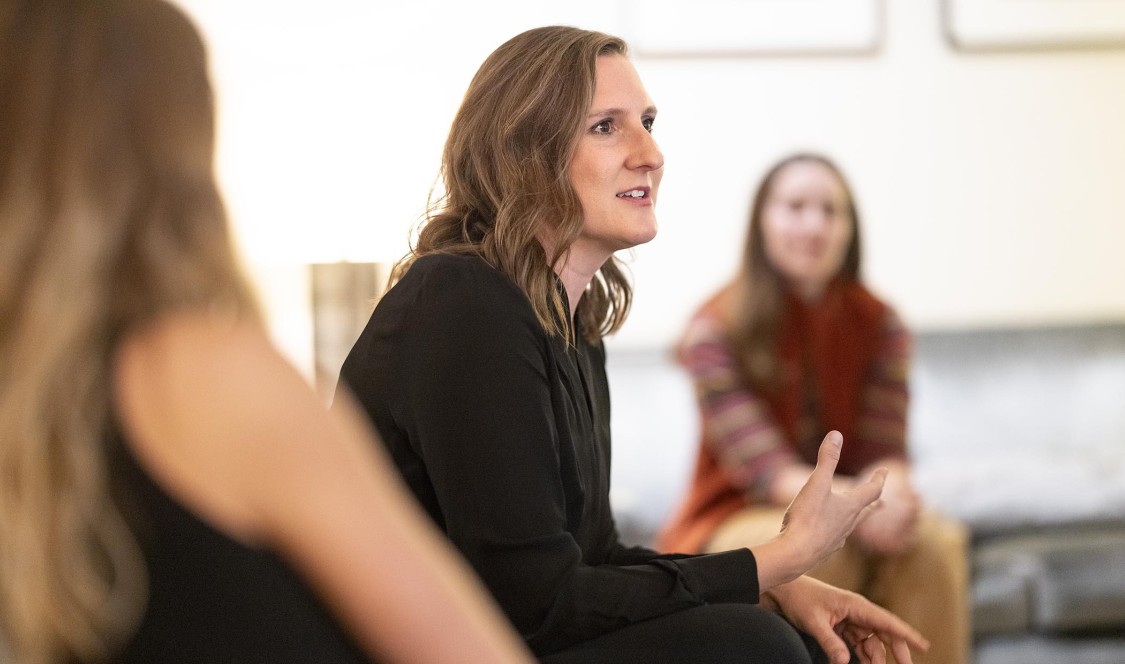Journalist Helena Bottemiller Evich ’09 opened her reporter’s notebook and served an intriguing look at the politics that shape food production and consumption along with its impacts on efforts to address climate change.
Evich’s Athenaeum talk, “The Politics of Food and Climate Change,” looked at the global impact of what is on your plate and how it got there. The discussion was part of the Roberts Environmental Center’s Sustainable Food Initiative 2024-2025.
While agriculture’s contribution to greenhouse gasses is considerably less than energy production, Evich pointed out that it has a large enough footprint to make addressing it a critical priority. “Twenty-six percent of greenhouse gas emissions come from food,” she said. “Fifty percent of the world’s habitable land is used for agriculture. About 70 percent of the world’s freshwater is used for agriculture.”
If those numbers are daunting in their scope, the wastage factor in the United States is even more dramatic, said Evich, who reported that upwards of 40 percent of American food goes into the trash.
“Hopefully, not what’s in your mini-fridges,” she joked with students.

After graduating from CMC, Evich became a Senior Reporter at POLITICO before founding her current site Food Fix, and she opened her presentation by providing a behind-the-scenes perspective on her block-buster investigation into the failings of the Food and Drug Administration (FDA) that POLITICO published in April 2022.
“I had been following the FDA for so long—from my (Claremont McKenna) thesis in 2009 until I published this in 2022, that I could really see—I really had a good understanding of where this agency was not working and where it was,” Evich said, adding that her story on the FDA’s inadequacies hit Washington, D.C. just as the baby formula crisis was also making landfall inside the Beltway.
“I couldn’t have planned this, but it happened to come when the infant formula crisis was happening,” she said. “This was sort of a perfect storm in Washington.”
But not perfect enough to alter the political currents that have made farming and food production in the United States as well as Europe a third rail, one with enough high-voltage coursing through it to keep even the Obama Administration at bay. Evich said that when efforts to include environmental sustainability into the government’s nutrition guidelines were proposed, it triggered massive blowback.
“This idea created an all-out war in Washington,” she said. “It was chaos, the meat groups were angry, the livestock groups were angry, the Republicans were angry, some Democrats were angry, farm state Democrats were really angry.”
The Obama Administration dropped the proposal.
Real change directed at reducing the climate impacts resulting from food production is more likely to come, at least for the time being, from private sector initiatives than government policy, Evich said, while also pointing out that often-criticized corporate commitments have been very helpful in generating a more accurate account of the problem.
Another silver lining, Evich said, is that farmers are seeing the practical benefits of regenerative farming practices.
Student Question
Caleb Rasor ’28, a first-year student at CMC majoring in Economics, asked if private enterprise has been successful in moving the needle whatsoever in the direction of a more sustainable food production model.
“You talked a lot about how the government has been slowly getting involved in educating farmers and promoting regenerative agriculture,” Rasor asked. “I'm curious if you know of any nonprofits that have been working in that space, and if so, if they’ve had any success.”
Evich’s assessment was blunt, but not entirely grim.
“I really think that is not the case,” she said. “It’ll be like neighbor-to-neighbor. I think neighbors are more important. My neighbor did this. It worked. They’re at the coffee shop. They’re talking. There’s a lot of cross-cultivation happening.”

